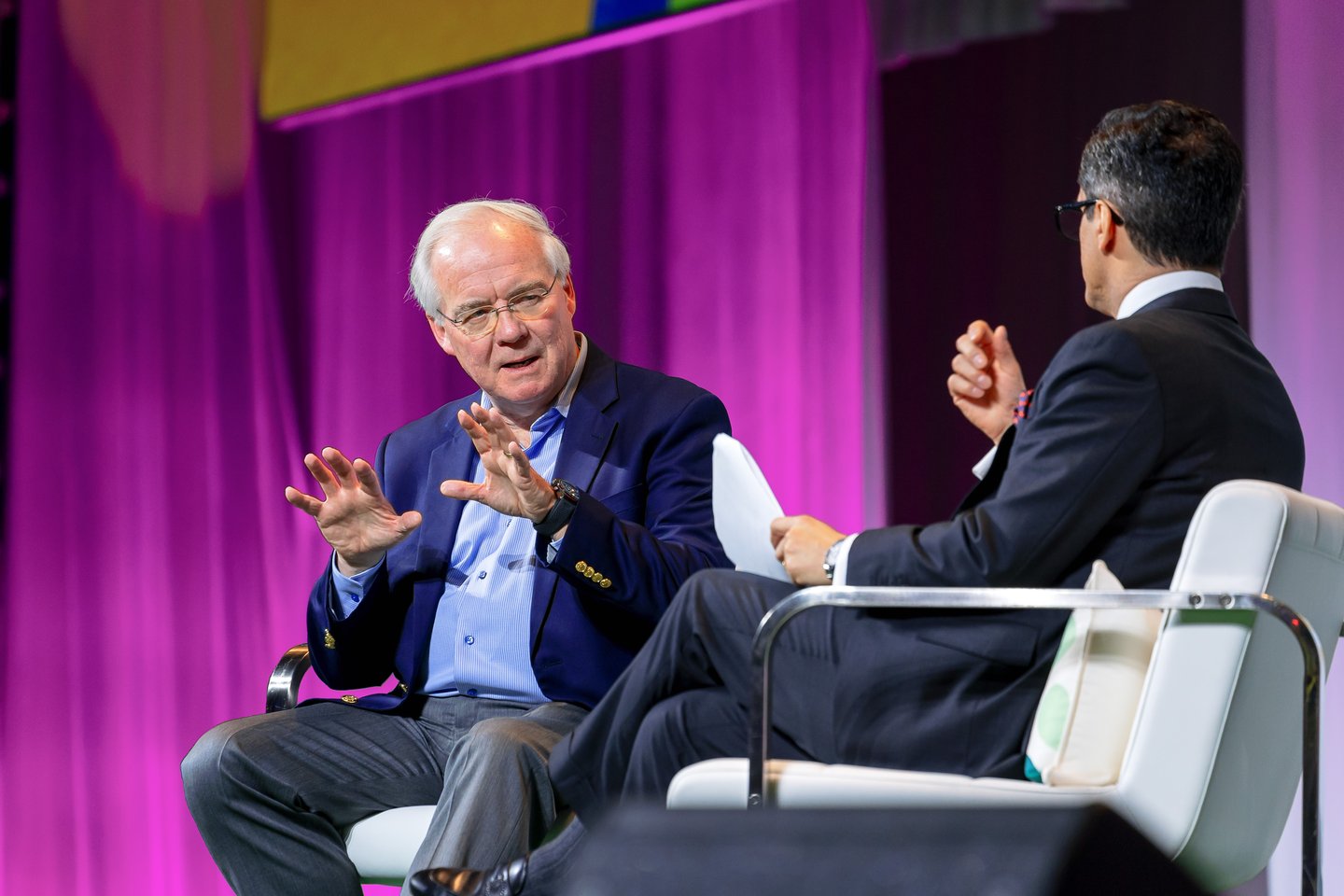Kroger's Rodney McMullen talks consumers, produce and leadership at GPFS show
“I’ve never had a customer tell me that we charge too little. I’ve had a lot tell me we charge too much,” said Kroger chairman and CEO Rodney McMullen. “If you ever lose sight of value for the customer, you’ve got problems.”
McMullen was speaking at the International Fresh Produce Association’s (IFPA) Global Produce and Floral Show, which took place last week in Atlanta, Ga.
When asked by interviewer Patrick Vizzone, professor and co-founder of Vertical Oceans, how Kroger—the largest grocery chain in the United States, serving 11 million customers a day—has adapted to the changing consumer over his tenure as CEO, McMullen said it was important to be mindful of “changes and non-changes.” While consumers continue to seek value as they always have, other things, like the notion of convenience, have changed. “Convenience today is totally different than it was 10 years ago. Convenience today is, ‘I don’t know what I’m having for dinner,’ and I got to my app and I get the delivery in 30 minutes or less,” he said.
McMullen also noted that a decade ago, the grocery giant’s capital budget would have predominantly been used for store-based investments, whereas today investments are more about creating a seamless experience between physical and digital operations. “What we find is the customer wants to engage with us sometimes for delivery, sometimes pickup and sometimes in-store,” he said. “There’s a tremendous amount of technology that you need to invest in to make sure that the customer can bounce back and forth, so we spend multiples more on technology today,” he said. “We spend more on supply chain today because if you think about produce, you’ve got to figure out a way to get it from the farm to the customer faster,” something that is achieved by a combination of partnerships, having a better supply chain and technology, he said.
READ: How retailers like Kroger and Jacksons Food are using AI to combat theft
On the topic of produce, Vizzone asked McMullen why he thought the department was doing better than centre store at Kroger.
“It really gets back to food as medicine,” said McMullen, noting that much of the healthcare costs in the United States are preventable. One way to help fix this, he said, is to get people to change what they eat. “In the U.S., I do think we’re a little slow focusing on personal health because for a long time you thought you could take a pill and take care of it, but everything we can see is people focusing more on health. [As a retailer], you have to figure out how to do it in a way that [people] like,” he said, highlighting Kroger's OptUP, an app-based nutrition rating system that aims to make it simpler for customers to choose more nourishing foods.
“It’s very easy to use and if somebody’s buying ice cream [it can] influence them to buy an ice cream that would be a little bit better for them,” he said, though he admitted it’s more difficult to get customers to opt for broccoli over ice cream. One solution is to ensure the best-tasting produce is always available to encourage customers make better choices. “Think about grapes. I’ve had grapes that are OK, and last week the grapes I bought at Kroger were spectacular. How do we make sure that we [retailers and producers] partner together to make sure that when the customer gets something it’s amazingly fresh and amazingly tasteful?”
READ: Consumers are turning to grocery retailers as key allies in healthy living
On working with suppliers, McMullen emphasized the importance of partnerships. “We don’t ever look at it as an arm-wrestling competition, because if we don’t make any money, we’re not going to be able to support you. But if you don’t make any money, you’re not going to be able to support us—and so, it’s a partnership.”
McMullen, who joined Kroger in 1978 as a part-time clerk while in university and became CEO in 2014, was also asked about his leadership philosophy and what lessons he’s learned along the way.
“First of all, I don’t think you ever ‘arrive’ … I’m still trying to become a better leader,” he said. McMullen added that he’s a “massive believer” in education. He pointed to Kroger’s Feed Your Future program that supports employees from a “GED to a PhD” so they continue to learn and help drive the business forward. “Each of us in our own companies have a responsibility to support our teams for the next generation, so what are you doing to make sure the generation coming up is doing something better than you can?”
Known as an empathic leader, McMullen was asked how he was able to balance leading with empathy while continuing to move the company along financially.
“Figuring out the balance is what makes it fun, but if you’re not a human being, then you don’t have the right to lead anybody. And I wouldn’t be who I am or where I am if it wasn’t for a lot of people along the way,” he said.




